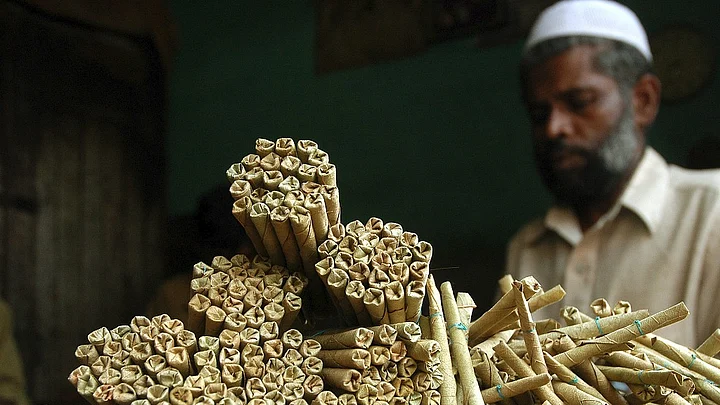How often does an industry which produces and sells goods, requests a government to increase the taxes on their own products? One particular group in India is doing that, pleading the case at a time when India’s biggest tax reform, the GST, is shaping up.
They are hoping they don’t miss the bus and that the government does something this time around to end their cycle of poverty, ill health and yes, deaths.
For years, the bidi has been modelled as a ‘poor man’s pleasure’.
‘It does have some harmful effects but life is tough for the poor already; why snatch away their one indulgence’ – unsubstantiated arguments such as these are often made by the bidi industry in India.
Unfortunately, these are arguments that have been accepted by the governments in India over the years. And it’s costing the country over a million tobacco-related deaths each year. Almost two-thirds of tobacco consumers in India consume bidis.
While the GST has commendably stacked the cigarettes and smokeless tobacco products in the highest tax bracket at 28%, it’s still unclear on bidi, a product which is consumed more and is more harmful.
Now, bidi workers from at least four different states of UP, West Bengal, Tamil Nadu and Bihar have written letters to Prime Minister Narendra Modi. Their plea is simple: Increase taxes on bidi.
Here’s why:
1. Bidi Is No Longer A Cottage Industry
The sector is highly organised but enjoys the benefits of a cottage industry and pays lower taxes. Subsidies are pocketed by the industry owners, making huge profits. The bidi workers, on the other hand, earn barely enough to survive and are driven into an endless cycle of poverty and economic slavery.
At least 1,000-1,200 bidis are rolled by each worker every day, for an average pay of 100 rupees a day!
2. It’s Not Saving Livelihoods, It’s Costing Lives
Bidis have been subjected to low taxes largely under the pretext of saving livelihoods. But the fact is, bidi rollers are made to work in deplorable and unhygienic conditions. Just 4-5 years of rolling bidis has adverse health effects.
A large number of workers, including women and children, suffer from tuberculosis, asthma, bronchitis, malnutrition, anemia, lung and thorax cancers. There’s also the burden of millions of Indians who consume it.
3. Alternate Employment, Not Lower Taxation
It’s a clear cry for help from the grassroots. The industry owners are seeking lowered taxes and subsidies in the GST, but the workers themselves are asking the government to see the ground reality: The need for a different livelihood. The plea is to use the tax money to save lives and help them find alternative jobs. Not push them back into poverty.
More reasons:
It’s A Child Rights Issue
Experts say approximately more than a million children in India roll bidis. They are actively engaged by the bidi factories as it is believed that children’s nimble fingers roll the bidis better. In the process, children absorb high doses of nicotine directly through their skin.
Childhood, health, education – all are sacrificed to the economics of survival and slave-like working conditions. Most children follow their parents who work hard rolling bidis but barely make enough to survive.
Hope from GST
Over the past years, the central government has been reluctant to increase taxes on bidi. However, different states have taxed it anywhere between 12% to 65%. The advent of GST will change this and is therefore a matter of much deliberation. In fact, it’s up for debate early next week as experts deliberate further on GST.
Economics of Bidi
It’s high time the finance minister, who has also received the same plea, sees through the economics of bidi:
• 4.52 trillion cigarettes and 40.3 trillion bidis have been produced between 1910 and 2010.
• Tobacco costs a million deaths each year in India. Studies have predicted 100 million premature deaths due to tobacco used in the 100 years between 1910 -2010 in India.
• Healthcare costs of tobacco related diseases, amounting to Rs 1,04,500 crore (estimates from 2011), outweigh the revenue contributed by tobacco.
Bidi and Taxation
Economists have estimated that:
• An 18% GST on bidi will increase its consumption 1.25% and
• A 28% GST will lead to a dip in consumption by 0.77% (a substantial number of lives will be saved.)
The next deliberation on GST, on 3 June, is likely to table this and will indeed decide the fate of millions of Indians. Will this government do something that its predecessors could not, bowing to industry pressures? India is waiting to find out.
(Shalini is a former television health journalist from India. She has extensively reported on public health issues and epidemics and is currently associated with the Center for Disease Dynamics, Economics & Policy.)

